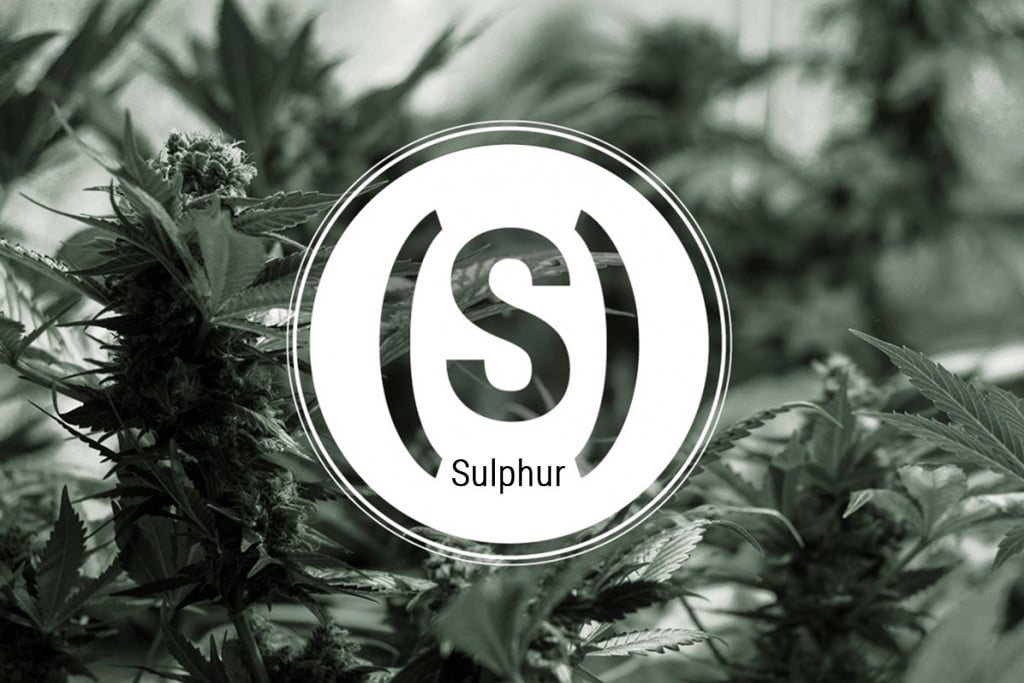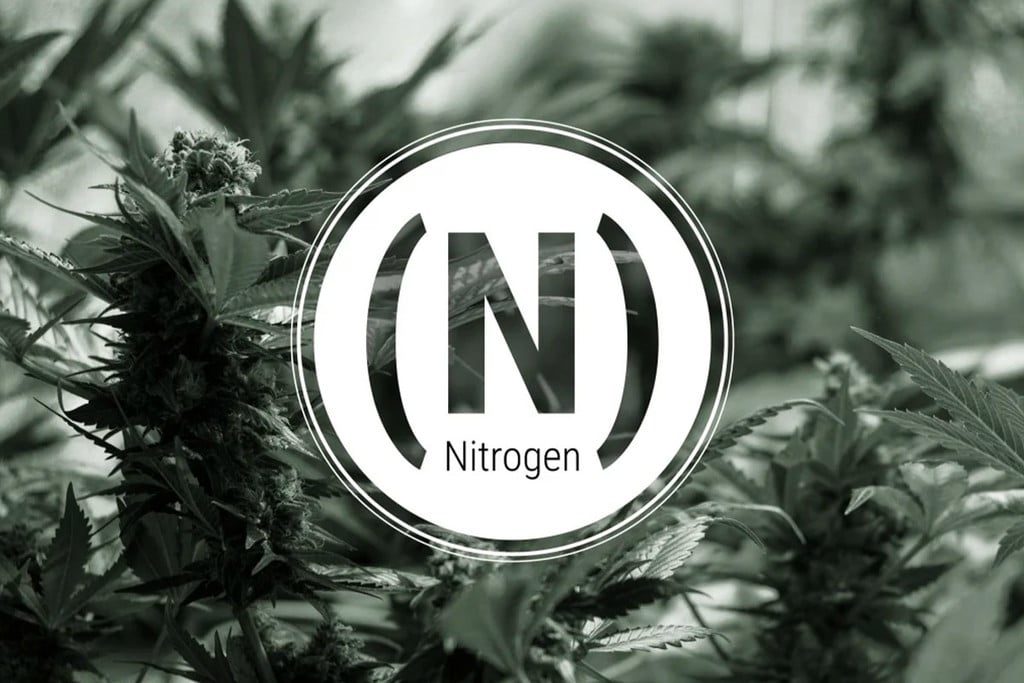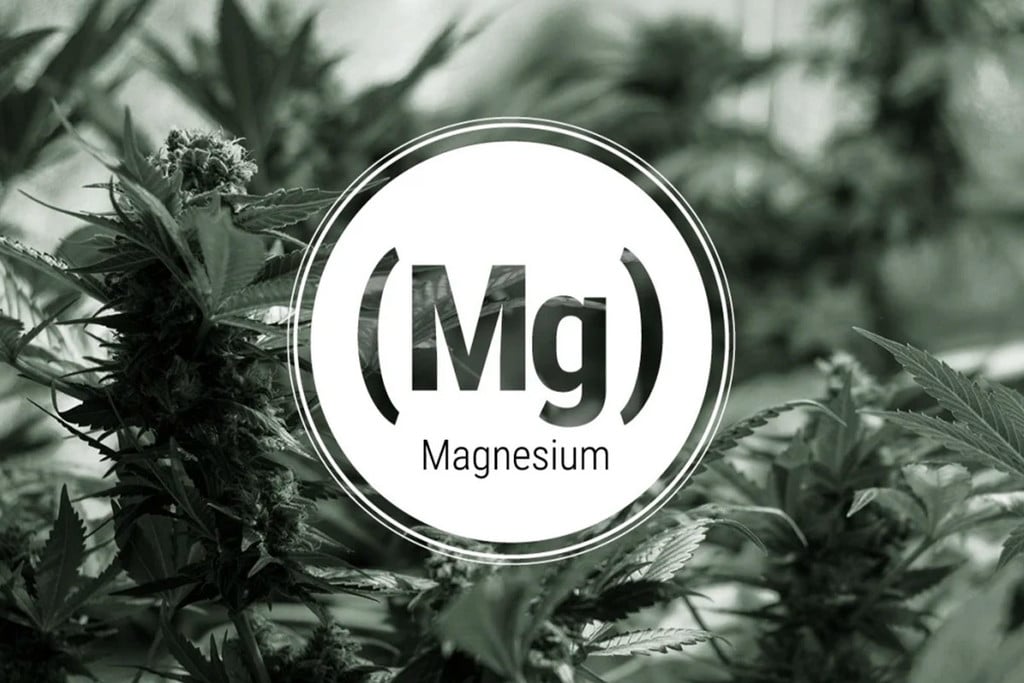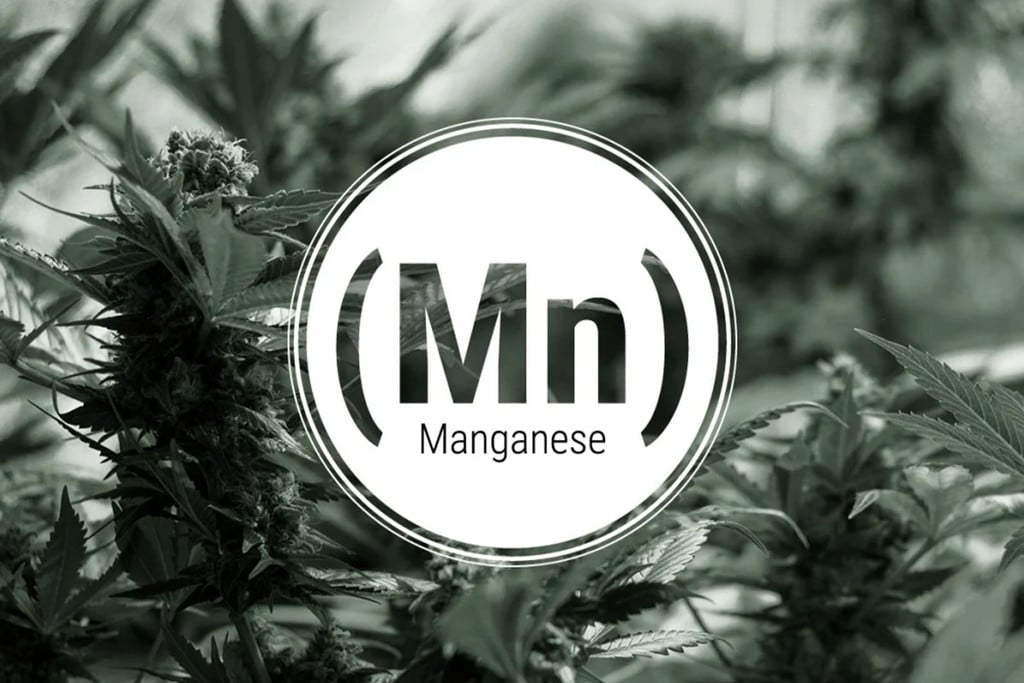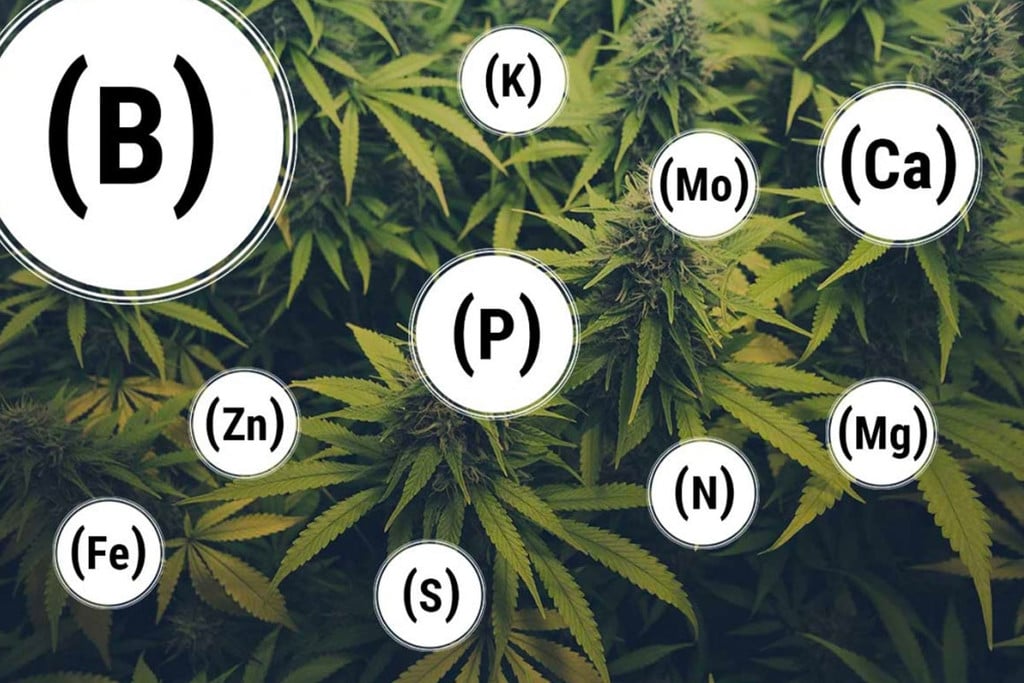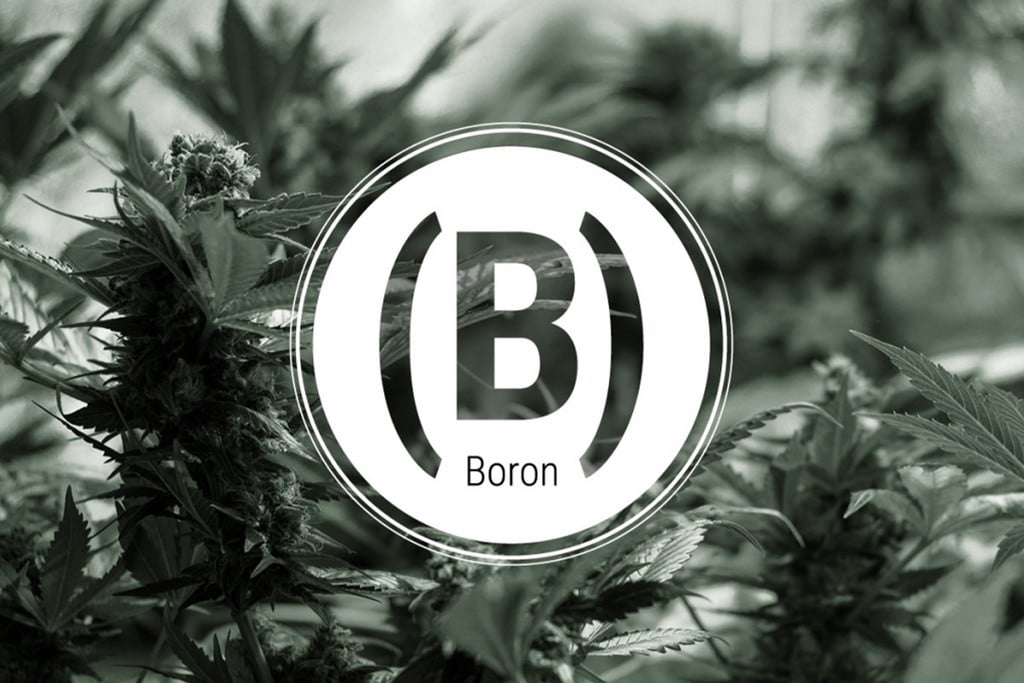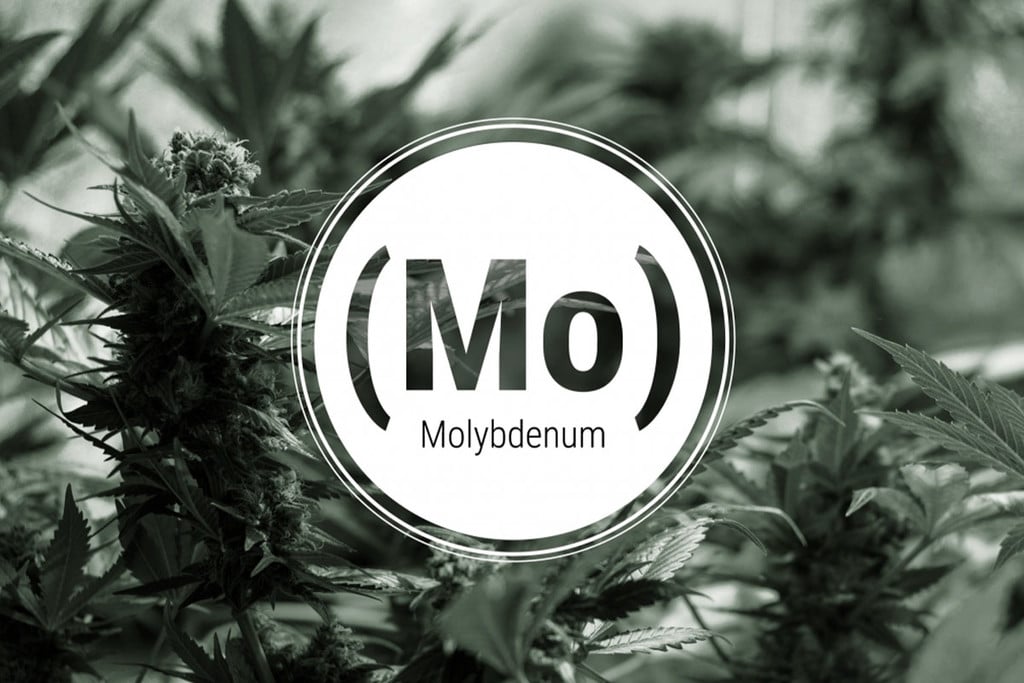.
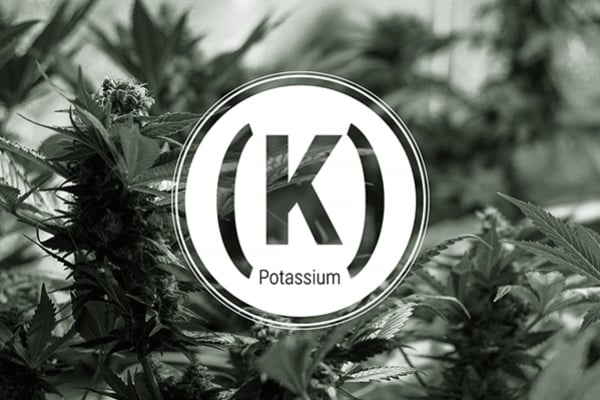
Potassium Deficiency in Cannabis: Signs and Solutions
Potassium plays a key role in cannabis plant health. This element activates key enzymes, helps plants remain structurally strong, and helps to transport water and nutrients. Plants quickly exhibit signs of deficiency when they don't get enough, including yellow leaves. Find out how to treat and prevent a lack of potassium.
Contents:
Potassium plays a key role in cannabis plant health. Potassium plays a key role in cannabis plant health. This element activates key enzymes, helps plants remain structurally strong, and helps to transport water and nutrients. When potassium levels run low, or factors in the soil prevent its uptake, plants quickly take a turn for the worse.
Discover the true role of potassium in weed plants, what happens when they don’t get enough, and how to treat and prevent deficiencies.
Understanding the Role of Potassium In Cannabis Growth
Much like us humans, our plant friends also depend on ample levels of potassium not just to function well, but to survive at all. In terms of human physiology, potassium (represented by the elemental symbol K) keeps us alive by normalising blood pressure and managing the amount of fluid in our cells. In your precious weed crop, this nutrient plays an equally important role; it controls myriad plant functions, including cellular growth, water movement, nutrient transport, and stress responses.
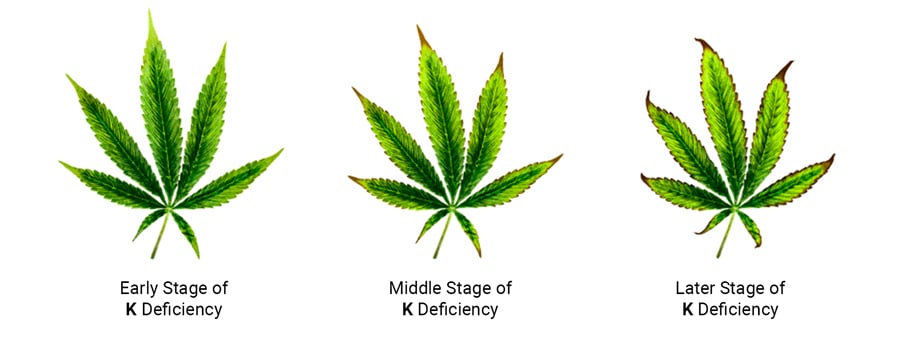
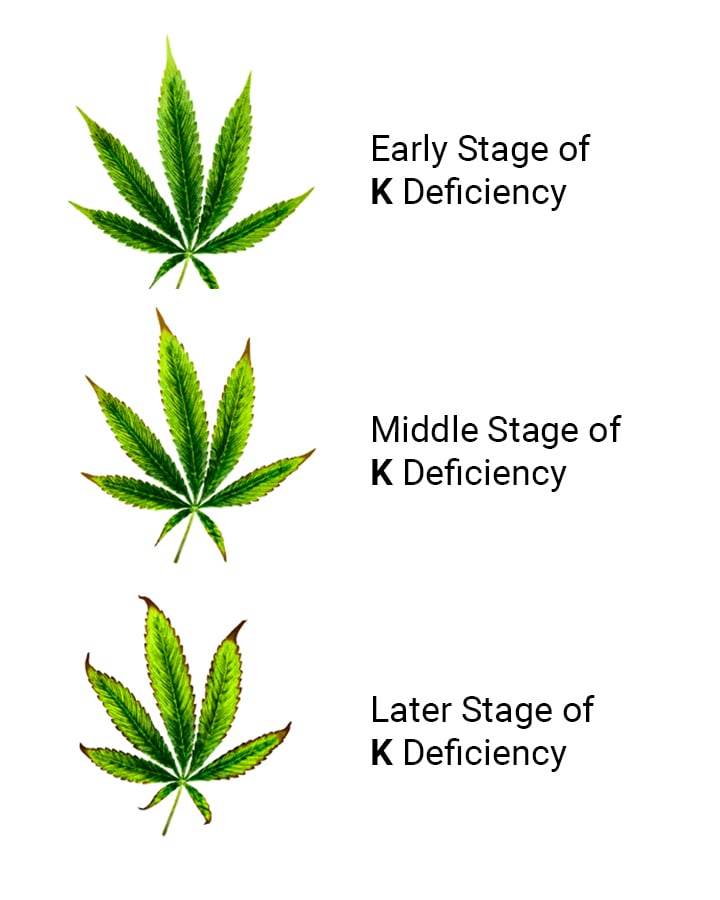
Potassium: A Primary Macronutrient for Cannabis
If you’ve ever dieted or become obsessed with the gym, you’ll have a good idea of the macronutrients and micronutrients humans need to function properly. Proteins, carbs, and fats make up the macronutrients we need for energy and structure, whereas micronutrients such as zinc and iron carry out key cellular functions. Weed plants also have their own specific breakdown of macronutrients and micronutrients that they need to develop properly.
Potassium falls firmly into the category of plant primary macronutrients, alongside nitrogen and phosphorus. They need this element in large quantities in order to properly grow. Without ample levels, plants quickly develop signs of deficiency and their size, productivity, and overall health will take a hit.
The Function of Potassium in Cannabis Plants
As a macronutrient, it shouldn’t surprise you that potassium plays a critical role in plant physiology. This single element enables plants to breathe, photosynthesise, and grow. Discover the major roles of potassium in cannabis plants below:
- Regulates stomatal opening
- You can’t tell with the naked eye, but cannabis leaves are covered in countless tiny openings called stomata. Guard cells are tasked with opening and closing these pores according to the needs of the plant and certain environmental variables. Potassium ions are responsible for the **swelling of guard cells and, thus, control their ability to open and close. In doing so, the mineral enables plants to remain turgid and carry out gas exchange.
- Activates ATP enzymes
- Plants need adequate levels of potassium to activate enzymes involved in key chemical reactions, including the synthesis of adenosine triphosphate (ATP). As the cellular unit of currency, ATP underpins many important cellular processes. Therefore, potassium ensures a steady supply of ATP that allows plants to uptake nutrients, create secondary metabolites, and respire.
- Osmoregulation
- Plants require optimal osmotic pressure in order to remain structurally firm or turgid. This enables them to grow upward toward the light, to stay upright in adverse weather, and to bear the weight of large resinous colas during the flowering phase. As the linchpin of osmoregulation, potassium regulates the movements of water across all cell membranes, preventing wilting and maintaining structural integrity.
- Protein and starch synthesis
- Potassium stokes enzymes that are responsible for the synthesis of both proteins and starches. Proteins make up key elements of plant cells, including enzymes, and help to carry out a wide **range of processes, including biosynthesis, photosynthesis, and transport. Starches, on the other hand, are large and complex carbohydrate molecules that serve as **reservoirs of cellular energy.
Cannabis and Potassium Deficiency: Signs and Symptoms
As you’ve just learned, plants are highly dependent upon potassium. So much so that large and constant supplies of the nutrient are non-negotiable. There are several reasons why plants sometimes fail to access enough potassium. When this happens, the following signs of deficiency can occur.
Leaf yellowing
First and foremost, cannabis potassium deficiency chiefly rears its head in the form of yellowing leaves. Typically, this symptom affects the lower leaves. Known as chlorosis, this yellow appearance occurs as plants reallocate potassium from older leaves to those higher up in the canopy in an effort to prioritise newer growth.
Browning leaf tips
You’ll also notice browning leaf tips start to emerge when your weed plants aren’t receiving enough potassium. Potassium represents the major cation in both the phloem and xylem—the principal vascular networks that pump water and nutrients throughout plant tissues. A lack of potassium compromises the function of these vital systems, in turn disturbing the distribution of water and nutrients throughout the plant. As the furthest points from the xylem and phloem of the main stem, leaf tips are the first to become cut off from important supplies.
Stunted growth
The two issues mentioned above directly impact plant growth. Leaves that turn yellow lose their capacity to carry out photosynthesis, meaning plants start to produce less energy overall. The same applies to leaves with damaged tips. The overall reduction in water and nutrient transport also contributes to a lack of vigour and growth. Finally, the reduction in protein and starch synthesis slows things down at the cellular level.
Weak stems
Potassium deficiency in cannabis also takes a toll on important anatomical components responsible for maintaining structure, namely the main stem, branches, and petioles. Potassium helps to maintain the turgidity of plants by bolstering cell walls and governing cellular fluid dynamics. A loss of turgidity causes stems to become weak, wilt, and lose their structural capacity. At best, this disrupts vascular transport; at worst, it can cause stems and branches to snap off completely.
Poor flower development
If you’ve ever grown weed before, you’ll know that cannabis plants depend heavily on higher concentrations of potassium and phosphorus when the flowering phase swings around. Potassium plays a fundamental role in flower development. Without adequate levels, flowers fail to thrive and appear smaller, less dense, and less resinous.
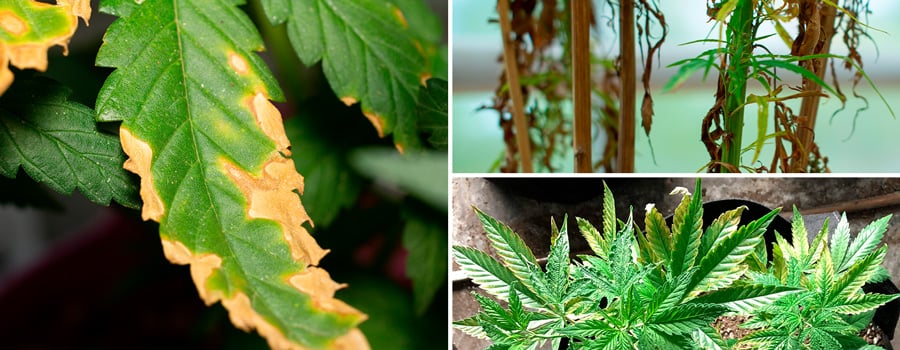
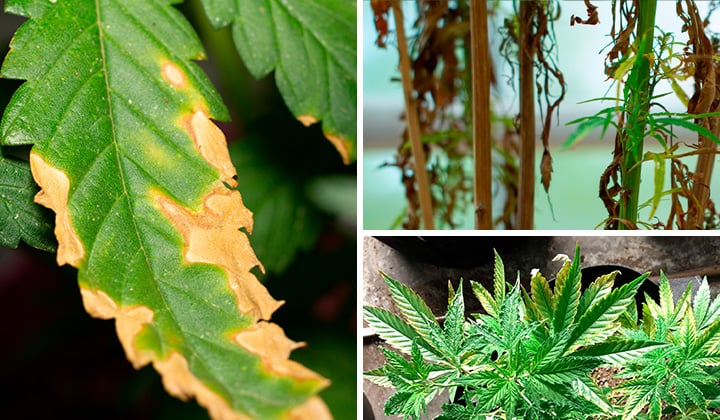
The Causes of Potassium Deficiency When Growing Weed
If you’ve encountered potassium deficiency when growing weed, you need to pinpoint the root cause of the problem. Without this knowledge, you’re simply throwing darts in the dark and wasting time. Continue reading to discover the major causes of potassium deficiency:
- Suboptimal cation exchange capacity (CEC): Certain fractions of the soil hold on to potassium and prevent the mineral from leeching away. Both clay and organic matter possess a net negative charge. As a positive ion—more specifically as a cation—potassium binds to these soil fractions. Optimal levels of clay and organic matter produce a better CEC in soil. However, a lack of either means potassium has nowhere to bind, meaning it’ll flush out of the soil during watering and leave plants hungry and deficient.
- Poor feeding regimen: Many organic and synthetic fertilisers feature high levels of potassium. However, if a grower fails to administer them correctly, they’ll leave plants without enough to carry out the necessary physiological functions that keep the signs of deficiency at bay.
- Lack of soil network organisms that solubilise potassium: Potassium exists in numerous forms within the soil. Plants have instant access to the ionic form of the mineral that clings to soil and organic matter particles. Some microbes convert available forms of potassium into unavailable forms that plants cannot access. Thankfully, species of potassium solubilising bacteria (KSB) are known to secrete organic acids and liberate bound-up potassium. However, soil low in beneficial biology means that potassium remains locked up and outside of the reach of cannabis plants.
- pH imbalance: The pH of soil references the level of acidity or alkalinity of the growing medium. Generally, cannabis plants prefer a slightly acidic pH of around 6.0. At this pH range, plants have no issues when it comes to up-taking potassium. However, as acidity rises, potassium becomes less and less available. For example, a pH of 5.0 can cause a 50% decrease in potassium availability, leading to severe signs of deficiency.
- Soil compaction: Overall soil structure determines how well, or how poorly, plants are able to uptake nutrients. Open, aerated, and moist soils send root health soaring, enabling these structures to grow large and access ions more easily. On the flip side, compacted and compressed soil lacks oxygen, space, and drainage. This directly impacts the health, size, and function of root systems, removing their ability to ferry adequate levels of potassium and other ions into the plant.
- Drought stress: Water underpins a whole host of vital physiological functions in plants. Heat waves outdoors and a poor watering schedule indoors can give rise to drought conditions. A lack of water can directly impact nutrient uptake and accumulation. Plants also rely on adequate amounts of water to distribute potassium throughout plant tissues.
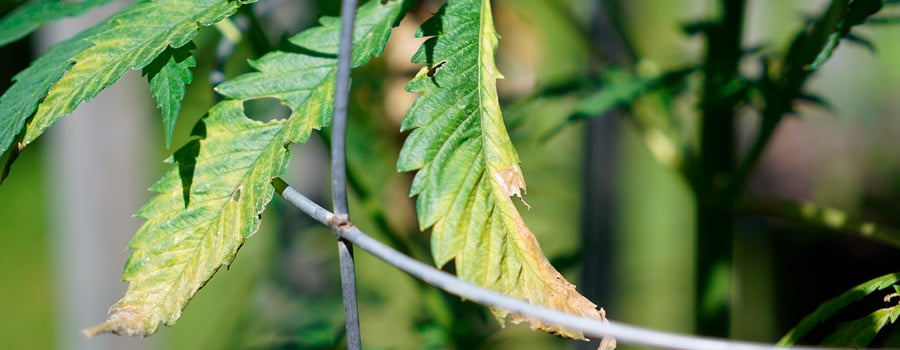
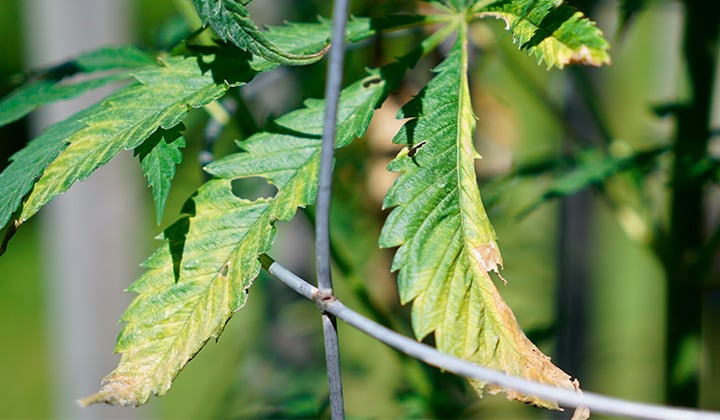
How To Treat Potassium Deficiency in Cannabis Plants
You’ve just discovered the key drivers of potassium deficiency when growing cannabis—that’s step one complete! Once you’ve accurately diagnosed your problem, you’ll have a clear and efficacious path ahead of you when it comes to treatment. Below, you’re going to learn how to quickly address K deficiency. Below, you’re going to learn how to quickly address potassium deficiency.
Apply Ionic Nutrients as a Root Drench
Typically, you want to avoid ionic nutrient salts. In the long run, they harm the delicate balance of life in the soil. However, they work wonders when it comes to swiftly addressing the signs of potassium deficiency when growing weed. Grab yourself a bottle of potassium-rich fertiliser and apply according to the product instructions until symptoms subside.
Apply a Potassium-Rich Foliar Spray
Remember the stomata we discussed further up the page? Well, it just so happens that these tiny holes serve as one of the quickest ways to get nutrients inside of plants. Apply a potassium-rich synthetic foliar spray to rapidly address the signs of deficiency. You can also opt for organic options, such as fermented fruit juice, that will provide good levels of both potassium and beneficial bacteria that will inoculate the phyllosphere.
Adjust Soil pH
If you’re dealing with a cannabis potassium deficiency, chances are your soil pH has drifted from its ideal range into an overly acidic state. First things first, flush your soil with several litres of water and let it drain. Next, apply a pH formula according to product instructions until you hit a pH value of around 6.0.
How To Prevent Potassium Deficiency When Growing Weed
After rescuing your plants using the strategies above, you’ll save yourself a whole lot of work and worry in the future by employing the prevention strategies below. Discover a handful of easy strategies that will prevent K deficiency from showing up in your growing space again.
Improve Your Soil Biology
Healthy soil biology all boils down to diversity. Having as many microbial species in your soil will create a balanced community and optimal predator and prey cycles. Conversely, a lack of diversity will impact this natural cycle and give pathogenic and detrimental organisms the opportunity to thrive.
Cover crops, mulches, and compost tea applications will feed soil organisms over time and provide habitat and sustenance for a rich range of species to emerge. Some of these organisms will indeed convert soluble K into an insoluble form. However, a flourishing community will also possess the right kinds of microbes[4]—including bacteria, fungi, and actinomycetes—to liberate potassium and make it accessible to your weed plants.
Refine Your Feeding Regimen
Whether you’re feeding your plants using organic or synthetic fertilisers, you need to ensure you’re giving the right amount at the correct intervals. Bottled products come with the advantage of N-P-K (nitrogen-phosphorus-potassium) values and detailed instructions and schedules that make it easy to apply them optimally. If you’re noticing signs of deficiency while using home-brewed fertiliser that lacks such accurate stats, switch over to a commercial formula until you figure out the best feeding schedule for your own preparations.
Frequently Measure Soil pH
Make measuring pH a part of your gardening routine. Just like you check on the dryness of the soil, look for the presence of pests and disease, and make sure your plants are well-fed, you should also make it a habit to measure pH around once every two weeks. Regular measurement will help you catch fluctuations early and prevent things from spiralling out of control. Use a simple pH tester to measure soil samples to make sure your plants are enjoying the optimal range.
Make Your Own Compost
Homemade compost works as a surprisingly good buffer against cannabis potassium deficiency for two primary reasons. Firstly, compost made correctly at home almost always outperforms any product you can buy from a garden center in terms of fertility. Secondly, it’ll also contain much more life, including species of microbes that help to cycle the potassium already bound up in the soil. Not to mention, you’ll save a ton of money if you get into the habit of composting all of your waste, instead of sending it to landfill.
Practise No-Dig to Avoid Soil Compaction
Certain horticultural practices help to maintain soil health, structure, and composition. Forgoing digging and tilling, a practice referred to as no-dig will help to improve your soil over time. It’ll result in a more aerated growing medium made up of stable aggregates and more capable of holding on to water while letting any excess drain free. No-dig cultivation drastically helps to reduce soil compaction, which makes for healthy and functional roots capable of acquiring all of the available potassium nearby.
Water Frequently to Avoid Drought Stress
There are plenty of ways to keep your soil adequately moist to assist potassium uptake and transport. If you’re only growing a couple of plants, hand watering will suffice. If you’re dealing with a bigger operation, consider setting up a drip irrigation system to keep the roots of your plants constantly wet. Not only will this reduce abiotic stress and keep your microbes alive and well, but it’ll keep vital nutrients flowing into your plants all season long.
Potassium: A Vital Nutrient From Seedling to Blooming
You’ve just stepped up your cannabis-growing knowledge to a whole new level. You’re aware of the important role that potassium plays in plant physiology, and what happens when plants don’t get enough of this mineral. You’re aware of the causes of marijuana potassium deficiency and how to quickly treat manifestations of the condition. Most importantly, you’re now equipped with the knowledge to prevent such a problem from occurring again in the future. Enjoy many years of deficiency-free cultivation, grower!
- Potassium Control of Plant Functions: Ecological and Agricultural Implications - PMC https://www.ncbi.nlm.nih.gov
- Potassium Application Boosts Photosynthesis and Sorbitol Biosynthesis and Accelerates Cold Acclimation of Common Plantain (Plantago major L.) - PMC https://www.ncbi.nlm.nih.gov
- Soil texture and pH effects on potash and phosphorus availability - Potash Development Association (PDA) https://www.pda.org.uk
- The use of soil microbial potassium solubilizers in potassium nutrient availability in soil and its dynamics | Annals of Microbiology | Full Text https://annalsmicrobiology.biomedcentral.com



























